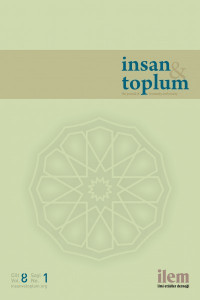Assessing the Link between Language and Identity: The Construction of Identities among Belgian-Turkish Migrants
Abstract
Çok-kültürlülük ve çok-dillilik, uluslararası göçün kaçınılmaz sonuçlarıdır. Farklı dilsel ya da etnik gruplar
arasındaki etkileşim, kişinin kimliğine özgü ifadelerin gelişimine neden olur ve göçmenler için hibrid kimliklerin oluşumuyla sonuçlanır. Bu hibrid kimliklerin anlaşılması ve tanımlanması için öncelikle kimlik inşa süreçlerini ve koşullarını doğru anlamlandırmak gerekir. Günümüzün çok dilli ve çok kültürlü Avrupa’sında, dil ideolojilerinin farklı kültürleri ve dilleri meşrulaştırma biçimleri, ulusal kimliklerden Avrupa kimliklerine kadar farklı kimliklerin bulunduğu bir çevrede bulunan göçmenlerin kimlik inşa sürecinde büyük öneme sahip. Bu araştırma, göçmenlerin kimlik oluşumuyla ilgili literatüre katkıda bulunmayı ve kimlik inşası süreçlerinde dil ile kimlik arasındaki bağlantının analitik bir bakış açısıyla değerlendirilmesini amaçlamaktadır. Bu bağlamda, Avrupa Birliği’nin merkezinde yer alan Belçika, çok dilliliğin hem devlet düzeyinde hem de sosyo-kültürel düzeyde var olduğu bir örnek olarak karışımıza çıkmaktadır. Bu sebeble, söz konusu araştırma için Belçika’daki Türk göçmenler üzerine odaklanılmıştır. Araştırma sonucunda, dil, kimlik ve aidiyet hususunda göçmenlerin söylemleri ile dilsel pratikleri arasındaki çelişkili durumlar ortaya çıkmıştır. Ayrıca, göçmenlerin alıcı ülkede maruz kaldığı kurumsal ve kültürel ayrımcılık, buradaki göçmenlerin farklı dilsel pratikler ile inşa ettikleri ulusötesi ve çok katmanlı yeni kimlik arayışlarına itmektedir. Bu araştırmada yer alan Belçika özelindeki analizlerden hareketle, çağdaş Avrupa’daki dil ideolojileri, entegrasyon/asimilasyon politikaları ile Belçikalı-Türk vatandaşların kimlik inşa süreçleri arasındaki bağlantı hakkında kapsamlı ve derin bir analiz sunulmaktadır.
Keywords
Dil ideolojisi çok-dillilik çok-kültürlülük Belçikalı-Türk göçmenler kimlik entegrasyon/ asimilasyon politikaları ulusaşırılık
References
- Anderson, B. (1991). Imagined communities: reflections on the origin and spread of nationalism. New York: Verso Press.
- Appadurai, A. (2007). Disjuncture and difference in the global cultural economy. In J. X. Inda and R. Rosaldo (Eds.), The Anthropology of Globalization: A Reader (pp. 47-65). Massachusetts: Black Well Publishers.
- Auer, P. (Ed.). (2013). Code-switching in conversation: Language, interaction and identity. Routledge.
- Balibar, E., & Wallerstein, I. (1991). Is There a ‘Neo-Racism’? In Etienne Balibar and Immanuel Wallerstein (Eds.) Race, Nation, Class: Ambiguous Identities, (C. Turner, Trans.), (pp. 17–28). London: Verso.
- Balibar, E. (2001). Droit de cite or Apartheid? In We, the people of Europe? (pp. 31-50). New Jersey: Princeton University Press.
- BBC. (2013, March 1). Merkel says German multicultural society has failed [News article]. Retrieved from http://www.bbc. co.uk/news/world-europe-11559451
Assessing the Link between Language and Identity: The Construction of Identities among Belgian-Turkish Migrants
Abstract
Multiculturalism and multilingualism are inevitable consequences of international migration. Contact between different linguistic or ethnic groups causes the development of expressions specific to one’s identity and for migrants it results in the construction of hybrid identities which are very complex to define and understand without knowing the conditions of their construction processes. This paper aims to contribute to the literature about the identity construction of migrants, to assess the link between language and identity in this process. In this regard, I have pursued a qualitative research focusing on the second-generation Turkish-speaking community in Belgium. As a result of the study, it is observed that the migrants’ ideologies show traces of national discourses most of the time but their actual language performances and practices contradict these ideologies. The immigrants facing institutional or cultural racism in the host country create new multidimensional and transnational spheres in which they perform multiple identities through varying language usages. This research aims to provide a more comprehensive and deeper analysis regarding the link among language ideologies, linguistic differences and identity construction processes in the contemporary Europe, starting from the Belgian case by taking into account the linguistic aspect in a supra-national environment.
Keywords
Language ideology multilingualism Turkish immigrants identity construction integration policies transnationalism linguistic differentiation.
References
- Anderson, B. (1991). Imagined communities: reflections on the origin and spread of nationalism. New York: Verso Press.
- Appadurai, A. (2007). Disjuncture and difference in the global cultural economy. In J. X. Inda and R. Rosaldo (Eds.), The Anthropology of Globalization: A Reader (pp. 47-65). Massachusetts: Black Well Publishers.
- Auer, P. (Ed.). (2013). Code-switching in conversation: Language, interaction and identity. Routledge.
- Balibar, E., & Wallerstein, I. (1991). Is There a ‘Neo-Racism’? In Etienne Balibar and Immanuel Wallerstein (Eds.) Race, Nation, Class: Ambiguous Identities, (C. Turner, Trans.), (pp. 17–28). London: Verso.
- Balibar, E. (2001). Droit de cite or Apartheid? In We, the people of Europe? (pp. 31-50). New Jersey: Princeton University Press.
- BBC. (2013, March 1). Merkel says German multicultural society has failed [News article]. Retrieved from http://www.bbc. co.uk/news/world-europe-11559451
Details
| Primary Language | English |
|---|---|
| Subjects | Religious Studies |
| Journal Section | Research Articles |
| Authors | |
| Publication Date | March 15, 2018 |
| Published in Issue | Year 2018 Volume: 8 Issue: 1 |


